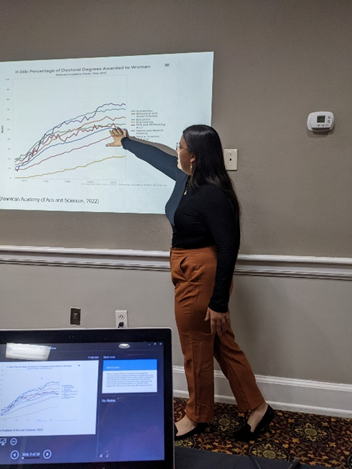Zoe Romaker, MSJ Sociology Major, Presents Her Senior Thesis at the Annual Meeting of the Mid-South Sociological Association in Nashville, TN, Under the Guidance of MSJ Assistant Professor of Sociology Dr. Richard Simon.

Mid-South Sociological Association
The Mid-South Sociological Association “founded in 1975, is a 501-C-(3) non-profit organization providing both professional support to, and a forum for sociologists who teach, conduct research and reside in the Mid-South region of the US. Through its publications, annual conference, academic support and collegial networks, MSSA, Inc. promotes the advancement of sociological research, the diffusion of knowledge, innovative service and teaching. From its inception, MSSA, Inc has been and continues to be committed to mentoring and enabling the growth of the next generation of sociologists in the value of high-quality research and engagement, and ethical, professional service.” (MSSA)
“In the Fall of each year, the Mid-South Sociological Association holds an annual conference in one of its member states. As with other professional organizations, the annual conference provides members an opportunity to network with other professionals, introduce students to the wider professional community and, most important, share and discuss current efforts in sociological research.” (MSSA)

Zoe Romaker’s Senior Thesis:
In October of 2022, sociology major Zoe Romaker presented her senior thesis research at the annual meeting of the Mid-South Sociological Association in Nashville, TN, under the guidance of MSJ Assistant Professor of Sociology Dr. Richard Simon. Her project, titled “Gender Differences in Occupational Values among University Faculty: Can Occupational Values Explain Gender Inequality in Academic Fields?” examined the role that career preferences play in explaining the gender imbalance in academic disciplines, drawing on a unique sample of 543 academic faculty across 13 elite high-research-activity universities. Results indicated a large and highly significant effect of communitarian occupational values on working in a female-dominated academic discipline for the female sample. However, communitarian occupational values were not significantly associated with gender distribution of academic discipline for the male sample. These findings suggest the importance of communitarian values for career choices for women, and the limited importance of communitarian values for men.

